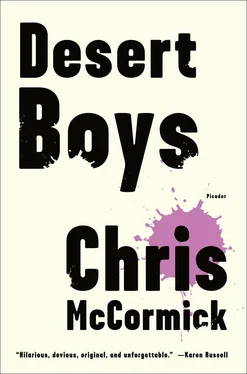“I really have no clue,” Watts said. “She just stopped answering the phone. Won’t text me back. It’s been, like, a month.”
“You guys didn’t have a fight? You didn’t say anything to piss her off?”
“No, man. It’s a serious mystery.”
I told him Roxanne’s issue was probably more about her than about him. “She’s closing in on eighteen,” I said. “She’s probably freaking out about what’s in store for the rest of her life. She just needs space, is my guess.”
“Yeah,” he said. “Maybe it’s not about me.” He passed the speed limit for the first time since I’d come on board. And that was the last we talked about Roxanne.
Then we were at my house, and before I left the truck, he asked if he’d see me again before I left town. I told him the truth, which is that I’d promised my mom I’d spend the whole weekend with her. “It’s the only way she let me come home for such a short amount of time,” I said. I thanked him again for the ride and offered him gas money, which he refused.
“Keep your cash,” he said. “But maybe I’ll call in a favor one of these days.”
“Please do,” I said. I laughed because I thought he was joking. By the time I’d reached the front door, he’d already sped off.
I found the key under the doormat. By the time my parents came home from work, separately but only fifteen minutes apart, I’d been in the backyard pool for almost two hours. The three of us stayed outside talking until sunset, which didn’t happen until nine. My dad complained about the recent surge in traffic—“Remember when ours could be the only car on the road?”—while my mom, every now and then, brought me feta-sprinkled cubes of fresh-cut watermelon, or reapplied sunscreen to the acne-scarred terrain of my back.
“Are you sure they won’t let you stay longer?” she asked more than once. And although a part of me envisioned a full three months of the kind of pampering given by an Armenian mother to her only son — the kind she’d argue was selfish because of how much she enjoyed it — I swallowed the cold bit of melon I’d plucked from the tray she set at poolside and said, “I’m sure.” It sounded, from what Dad was saying about the traffic, that the last thing the Antelope Valley needed was another long-term resident.
* * *
Friday morning I woke remembering a dream in which I was an indignant, nameless worker in a chemical factory, a dream I attributed to the smell of chlorine I’d brought with me to the sheets. My mom entered my bedroom bearing breakfast. She set the French toast and milk in my lap and perched at the foot of my bed to watch me eat. She’d already called her manager at the department store, she explained, to say she was sick and unable to make it to work. Without pausing to signify a change of topic, she asked how the food tasted—“Great,” I got out — and then asked how I wanted to spend the day.
My mother didn’t know I was queer — at least, we’d never spoken about it — and until I met someone worth bringing home, I didn’t see a need to tell her. But I suspected she could feel I was hiding something from her, and began seeing her adoration as a means of getting me to talk. If I turned down her pampering, I’d be giving credence to her suspicion that I had something to hide. So I wiped the syrup and powdered sugar from my lips and said, “I want to do whatever you want to do, Mom.”
What she wanted to do was this: First, she wanted to go to Starbucks, the one by the Target, and then take our coffees to Payless ShoeSource, where she wanted to buy me a pair of flip-flops. (“It’s too hot for socks,” she’d told me the night before, “but it’s not good to go around barefoot.”) Next, she wanted us to meet Dad on his lunch break, somewhere near his furniture store so he didn’t have to waste time in transit. (Here, she reminded me of the traffic.) How did Primo Burgers sound? I hadn’t become a vegetarian like my sister, had I? Lastly, she thought the two of us could spend the rest of the day at home. She had to wash the car in the driveway — I could spend some time reading then; she knew I probably wanted some time alone to read — and then she could make tea and hatz banir bamidor (bread, feta, tomatoes, and salted cucumbers), and we could sit in the backyard and eat and talk and drink tea and relax.
I found the plan exhausting. Intuiting this, my mom gathered my dishes and said, “There’s no rush. You’re on vacation. But for your dad’s lunch break, you know, we have to time it right.”
So I showered and dressed — without my mother’s help, I’m proud to say — and joined her in the driveway.
We waited for twenty minutes in a long line of cars inching to the intersection at Sierra Highway and K, expecting to find an accident or construction at the light. But when we finally passed through, I couldn’t spot signs of either. Outside the Starbucks, the drive-through line looped around the building, all the way out into the parking lot designated for Target garden center customers. Inside, however, the coffee shop was empty. “Don’t they know it takes longer in the drive-through?” my mom said once we’d gone back outside, triumphantly sipping caramel Frappuccinos and peering at the line of drivers waiting beside us. “Nobody wants to leave the car anymore,” she said, “not even for a minute.”
In an act of defiance, we decided to walk the three-quarters of a mile across the enormous parking lot separating us from our next destination, the shoe store. The weather reports might’ve called the temperature in the low 90s, but between the unobstructed sun and the asphalt, surrounded by the gleaming bodies of minivans and SUVs, and equipped with nothing but a melting milk shake to press against our foreheads, the heat was unbearable. We got maybe a fifth of the way to Payless before my mom stopped, shielded her eyes with a flattened hand, and asked if we could go back to get the car.
* * *
I was trying on my third pair of flip-flops when a woman who wasn’t my mother called my name. I recognized the accent, but didn’t realize who she was until she brought me in for a hug. Mrs. Watts — née Teresa Estrada — moved her long braid from one shoulder to the other and stood back to see me in full.
“Your skin looks good,” she said. “You look younger now than you did in high school.”
“Thanks,” I said, feeling a zit form on my nose. We talked about college and how I was enjoying the Bay Area, where she had some family, actually, in Richmond.
“How’s business?” my mom asked, a clumsy attempt to join the conversation. The extent of their relationship was that they’d met a handful of times over the years. They were both immigrants, loved their God and their families, and were notoriously good cooks. But these not-insubstantial overlaps hadn’t been able to spark a friendship, for whatever reason. I doubted Teresa would’ve approached my mother if I hadn’t been there.
“Business is wonderful,” Teresa said, though the way she stuffed her hands into the front pockets of her jeans hinted that she’d rather not talk about work. She and her husband ran a landscaping company, whose blue-and-white trucks I’d seen around town since before I knew Watts. “I’m on my way out,” she said, citing the curled receipt drooping from the plastic bag at her feet, “but I wanted to say hello.”
“Well,” my mom said. “Hello.”
“Hey,” Teresa said, “I want to have you over for dinner. The whole family.”
“Oh,” my mom said, putting on a ridiculous performance of gratitude. “I wanted to have your family over for dinner!”
“No, no — I offered first!”
“Well, Daley’s only here a couple more days,” my mom said, “so maybe the next time he’s home—”
Читать дальше












